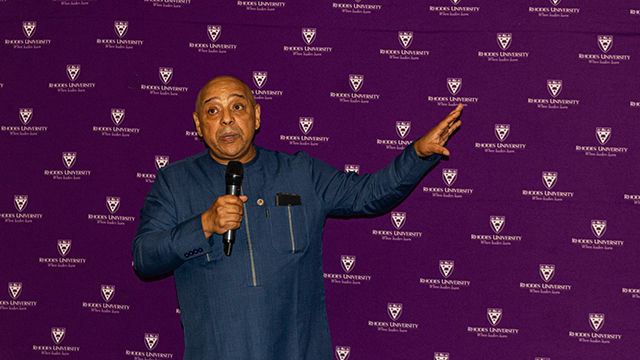
By Lalelisile Mncwabe
As the opening to Rhodes University's Africa Month celebrations, coordinated by the Global Engagement Division (GED), Logan Wort, Executive Secretary of the African Tax Administration Forum (ATAF), delivered a compelling public keynote address, urging African nations to strengthen their fiscal sovereignty by mobilising domestic resources and reducing reliance on foreign aid.
Driven by Mr Shepi Mati, a senior lecturer at the School of Journalism and Media Studies (JMS), the collaboration between GED, JMS, the Rhodes Business School, the Faculty of Commerce and the Department of Political and International Studies, ensured that Wort addressed a full auditorium of staff and students at the university’s Bioscience lecture hall. Wort highlighted the troubling extent of financial leakage from the continent. He noted that Africa loses an estimated $88 billion (around R1.67 trillion) annually through illicit financial flows, nearly double the $42 billion (approximately R798 billion) it receives in official development assistance. Strongly making the urgent call for Africa’s economic self-determination, Wort declared that “…we are net exporters of cash to the first world. It's time for us to take control of our own destiny and shape our own future”.
This alarming disparity underscores a broader argument: by tightening financial regulations, curbing illicit capital outflows, and improving domestic revenue collection, African countries could unlock substantial funds for development without turning to external lenders or donors. The need for strong tax systems has never been more pressing, especially in a global climate where some traditional aid sources, such as the United States, are scaling back their financial support to the continent.
The ATAF, which Wort has led since its establishment in 2008, plays a pivotal role in advancing this agenda. ATAF is a pan-African body that supports member states in strengthening tax policy, administration, and legislation. Over the past 15 years, the organisation has trained more than 13,000 tax professionals, facilitated peer learning, and helped assess upwards of $5.1 billion (roughly R96.9 billion) in tax revenue.
Wort emphasised that the future of African development depends on the continent’s ability to sustain itself financially. “The ATAF's work is a testament to the power of collective action and the importance of improving tax administration and policy across Africa,” he said.
A major part of ATAF’s strategy includes developing legislative guidelines and model tax treaties designed specifically for African contexts. These instruments assist countries in enacting effective tax laws that close loopholes, reduce base erosion, and prevent aggressive tax avoidance. Its model tax treaty is especially significant in empowering African nations to assert taxing rights over multinational enterprises that operate within their jurisdictions.
ATAF’s impact extends beyond the technical sphere. The organisation champions transparency and accountability in tax matters. Initiatives such as its tax transparency framework and guide on beneficial ownership aim to create a more equitable tax environment by exposing opaque financial structures often used to hide wealth and evade tax obligations.
Wort also highlighted ATAF’s growing influence in shaping the international tax landscape. The organisation is actively involved in negotiations such as the OECD’s Inclusive Framework on Base Erosion and Profit Shifting (BEPS), ensuring African perspectives are included in the formulation of global tax rules. By so doing, ATAF helps prevent African countries from being sidelined in decisions that directly affect their revenue streams.
Journalism lecturer Thandeka Gqubule-Mbeki, who emceed the event, expressed appreciation for Wort’s thought-provoking address, noting that the ATAF’s work is “critical in helping African countries to improve their tax systems and promote sustainable development”.
Wort’s call to action serves as a reminder that the path to Africa’s prosperity lies within the continent’s own hands. Through improved tax systems, reduced financial leakage, and strategic collaboration, African nations can build resilient economies that serve their people first.
Ending the event with a vote of thanks to the guest speaker and all involved in making it a success, Orla Quinlan, Director of Global Engagement, advised that the keynote formed part of Rhodes University’s Africa Month programme, which aims to inspire dialogue and critical reflection on African issues. It followed an earlier lunch-time seminar, hosted by Professor Tshidi Mohapeoloa, who is also Director of the Rhodes University Centre for Entrepreneurship Rapid Incubator (RU-CFERI), during which Wort engaged with staff and postgraduates on a wide range of African issues, trends and developments, including the digital economy, ideology and active citizenry.
The African Union (AU) theme for 2025 is “Year of Reparations: Justice for Africans and People of African Descent through Reparations". The initiative focuses on addressing the legacy of slavery, colonialism, apartheid, and genocide through a variety of measures, including financial compensation, cultural restitution, and institutional reforms. The Africa month programme will also offer opportunities to appreciate the rich cultural heritage and diversity of the continent.
